Biden’s Patriotic Duty—and Ours
The United States of America is not—yet—a family business. The future of our democracy is too important to be left to one man, his relatives, or his major donors.
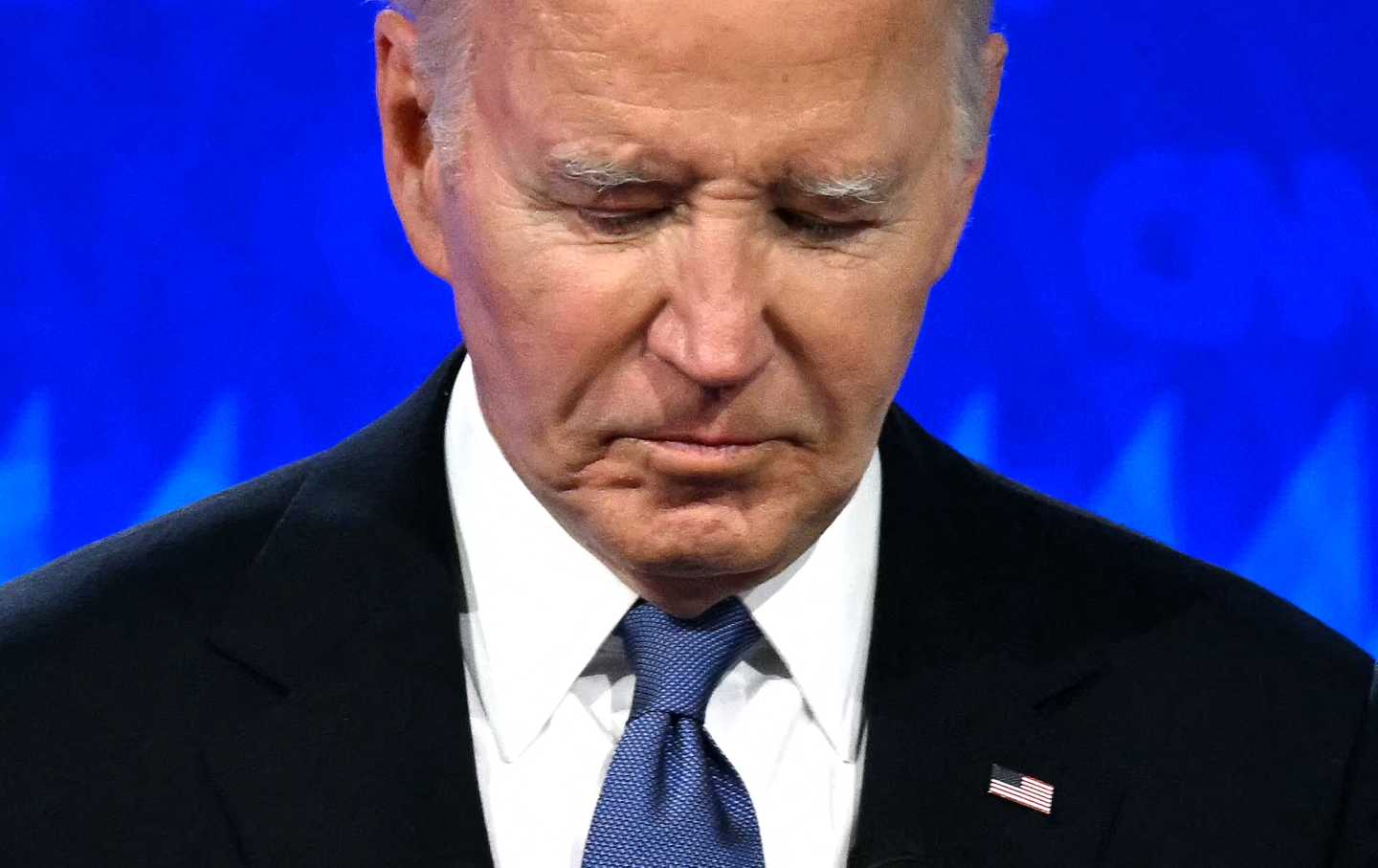
US President Joe Biden has an important decision to make.
(Andrew Caballero-Reynolds / Getty)
We are where we are.
Those of us who watched the whole 90-minute debacle last Thursday night will never forget what we saw: a clearly exhausted and often confused Joe Biden struggling to reach the end of his sentences—sometimes in vain—while an energetic if clearly unhinged Donald Trump radiated menace and mendacity in equal measure. That pathetic—indeed, given the reactionary playbook outlined in the GOP’s Project 2025 agenda, terrifying—performance simply cannot be undone by any amount of optimistic spin or stage-managed speeches.
Those who pretend otherwise do this country no service, inevitably bringing to mind Marx’s challenge: “Who are you gonna believe, me or your own eyes?” (Chico, not Karl.)
Which means we all—not just Joe Biden, or his family, or the tight circle of advisers he listens to, or the Democratic Party’s big donors, but everyone who cares about the preservation of our democracy—must acknowledge that there are only three possible options: Biden continues his campaign; he resigns the presidency in favor of Kamala Harris; he remains as president but ends his candidacy for reelection and releases his delegates, allowing them to choose the party’s nominee in Chicago in August.
All of these options are fraught with peril. And none of them guarantee victory over Donald Trump, who has maintained a small but significant polling lead over Biden since April, and was given a 66 percent chance of winning the election by Nate Silver even before the debate. In assessing each option, it’s worth bearing in mind that the task—Job One for any Democratic nominee—is both to make up that deficit and to provide sufficient momentum for the party’s House and Senate candidates to win the races that will be crucial in thwarting Trump’s authoritarian agenda should he prevail in November. (Or at least to not lead the rest of the ballot off an electoral cliff.)

Here's where to find podcasts from The Nation. Political talk without the boring parts, featuring the writers, activists and artists who shape the news, from a progressive perspective.
On this episode of See How They Run, D.D. Guttenplan is joined by Nation political correspondents, Jeet Heer and John Nichols to discuss President Biden’s post-debate crisis and where the Democratic party goes from here.
Advertising Inquiries: https://redcircle.com/brands
Privacy & Opt-Out: https://redcircle.com/privacy
This magazine has never minced words about Joe Biden. We preferred Bernie Sanders or Elizabeth Warren in 2020. While we endorsed Biden against Donald Trump—and will probably do so again should that be the choice in November—we’ve been consistently critical of his foreign policy. From China to Ukraine to the Middle East, he’s consistently failed to seize opportunities to end conflicts or promote any overall vision beyond global American belligerence (which we believe is a recipe for the endless wars that drain our resources, grind up our young men and women, and foreclose the changes at home needed to deliver on Democratic platform promises of justice and prosperity). We’ve also regularly urged him to be less deferential to the dead hand of bipartisan convention, and less respectful of what has become a clearly politicized and reactionary Supreme Court.
At the same time, we’ve never hesitated to give the president his due, acknowledging that his domestic appointments have often been surprisingly progressive, while his deft management of the economy deserves our gratitude. Indeed, just last month we noted that “Biden has easily been the most progressive Democratic president since Lyndon Johnson.”
That, at least, would be his legacy should he decide to belatedly fulfill his 2020 pledge to serve as “a bridge, not as anything else” to a new “generation of leaders” by stepping aside. Because Biden can still take the win, and retire garlanded with honor and the country’s affection. Should he persist, however, in putting personal pride ahead of patriotism on the increasingly implausible argument that only he can defeat Trump, and then lead his party to defeat in November, that legacy will be destroyed beyond any revision or redemption.
Nor is it only Biden’s reputation that would be at risk. The inner circle of careerists who kept the extent of his frailty from the public until it was too late to challenge him in the primaries should be driven from public life with at least the fervor the party devoted to purging the “McGovernites” who led it to defeat in 1972. Likewise, the centrist politicians and corporate donors who lack the courage to speak out now—very much including Barack Obama, whose thumb on the scales in 2020 (along with a Covid-curtailed campaign season) turned a losing candidate into the party’s anointed nominee. Not to mention the cynical claque of media enablers whose denial and deflection have become a siren’s chorus luring our democracy to political shipwreck.
Make no mistake, it is the liberal and left wings of the party who have long been the adults in the room here. From Sanders’s acceptance in 2020 that his rival Biden might indeed be more likely to defeat Trump, to Ezra Klein’s prescient attempt to raise this issue back in February, to Jeet Heer’s reluctant conclusion last Thursday night that while “Trump was terrible, Biden was worse.” None of them—none of us—expects a change at the top of the ticket to result in an even marginally more progressive candidate; we are all resigned to taking this one for the team, at least as far as ideology is concerned. But anyone who believes, as Biden has long professed, that defeating Trump is both a necessity and in some ways a sufficient aim for this election needs to ask themselves whether a candidate whose principal negative—voters’ reasonable fear that the man they saw in the debate is simply not up to that paramount task—is now irrevocably baked in, is really our last, best hope.
Kamala Harris—a former prosecutor, and as loyal to the president’s agenda as any vice president, including Biden himself—would not be this magazine’s first choice in 2024. But her poll numbers are already slightly better than Biden’s. And simply by virtue of not being Biden, she gains several advantages in addition to being a vigorous, capable 59-year-old. She may have views on Gaza similar to her boss’s, but she’s seemed more willing to be critical of Israel, and the intense hatred Biden now attracts from young voters has not fastened on her. Her outspoken condemnation of the Dobbs decision—where, unlike Biden, she has no reluctance to use the word “abortion” while defending a woman’s right to control her own fertility—has earned her the trust and gratitude of women across the country. Deeply embedded in both the Black and Indian-American communities, she has strong ties to crucial elements of the party’s electoral base. As for her skills on the debate stage, her stinging rebuke of Biden’s own past collusion with segregationists is what first marked her out from the crowd in 2020. Fact-checking Trump in real time is a hopeless task—his lies come too fast and stretch the truth too far for that—but we can be confident Harris would not remain tongue-tied.
If Biden resigns the presidency before August 7, the transition to a Harris-led ticket could be relatively seamless. As leader of the Democratic Party, she would have first claim on Biden’s pledged delegates, and a smoother path to the use of his nearly $100 million campaign war chest than any competitor. Her presence at the top of the ticket would bring a jolt of energy, enthusiasm, and media attention to what had become a numbing narrative of despair. And she would be free not only to signal a fresh approach—for example by summoning Chuck Schumer and asking him to rescind Netanyahu’s invitation to address Congress—but to choose whichever running mate she felt would do most to broaden the party’s appeal. (Personally, I like the historic boldness of a Harris-Whitmer ticket, but there are certainly other capable women, and men, on the party’s deep bench.)
The downside is that Harris might also lose—a point apparently already being hammered by some of Biden’s inner circle. (This whispering campaign by Biden stans claiming Harris still isn’t up the job doesn’t say much for their leader’s judgement, or courage, given that he’s had years to make a change.) Such doubts are also presumably behind talk of a brokered convention, holding open the possibility of nominating candidates some pundits have deemed more electable, such as Gavin Newsom, J.B. Pritzker, or (again) Whitmer. However this fantasy founders on the likelihood that any attempt to persuade Harris to withdraw her own claims would trigger a Democratic civil war that could make 1968 look like a food fight—and certainly usher Trump back into the Oval Office. Not to mention that, with the DNC now committed to a virtual roll call on the nomination by August 7, the whole contest would have to play out in the next month. Or that, as our comrades at The New Republic recently noted, “kicking voters to the curb in favor of allowing a few thousand party delegates to decide the nominee is an odd look” for a party fighting to save democracy.
Because those are the stakes. And shifting our focus to the House and Senate—crucial as those contests will be—is not the answer, even though if Biden remains in the race we certainly can’t expect his coattails to carry any candidate over the finish line.
What has become increasingly clear over the past several weeks—not only during the debate, but with every 6-3 decision handed down by Trump’s Supreme Court, from overturning Chevron to presidential immunity—is that this election is our rendezvous with destiny. Regardless of personal preferences, or righteous anger over any single issue or disappointment, we cannot afford to fail.
Popular
“swipe left below to view more authors”Swipe →If you agree that the fate of our democracy is too important to leave to Biden’s inner circle, you can:
Contact the White House. Comments telephone number: 202-456-1111; e-mail [email protected]; [email protected].
Contact the Democratic National Committee. Chair Jamie Harrison’s e-mail: [email protected]; DNC Secretary: [email protected].
Let Senator Chuck Schumer hear from you. Office telephone: 202-224-6542; e-mail: [email protected].
And when you do, please let us know or send a copy to [email protected].
Can we count on you?
In the coming election, the fate of our democracy and fundamental civil rights are on the ballot. The conservative architects of Project 2025 are scheming to institutionalize Donald Trump’s authoritarian vision across all levels of government if he should win.
We’ve already seen events that fill us with both dread and cautious optimism—throughout it all, The Nation has been a bulwark against misinformation and an advocate for bold, principled perspectives. Our dedicated writers have sat down with Kamala Harris and Bernie Sanders for interviews, unpacked the shallow right-wing populist appeals of J.D. Vance, and debated the pathway for a Democratic victory in November.
Stories like these and the one you just read are vital at this critical juncture in our country’s history. Now more than ever, we need clear-eyed and deeply reported independent journalism to make sense of the headlines and sort fact from fiction. Donate today and join our 160-year legacy of speaking truth to power and uplifting the voices of grassroots advocates.
Throughout 2024 and what is likely the defining election of our lifetimes, we need your support to continue publishing the insightful journalism you rely on.
Thank you,
The Editors of The Nation
More from The Nation
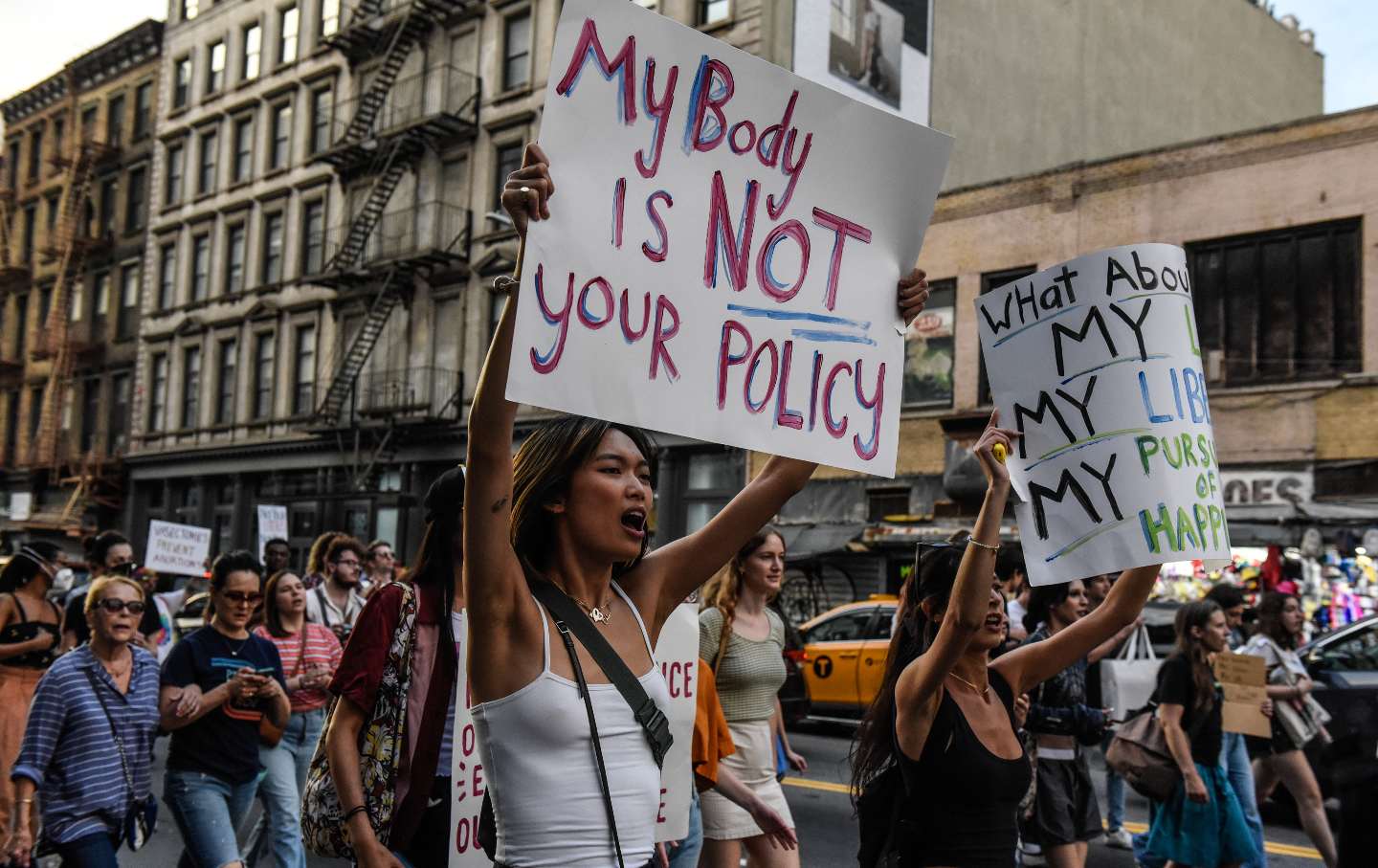
New York’s Proposed Equal Rights Amendment Is the Most Inclusive Yet New York’s Proposed Equal Rights Amendment Is the Most Inclusive Yet
Over 20 states already have a version of the ERA, but Prop 1 would also prohibit reproductive discrimination and codify abortion access in the state.
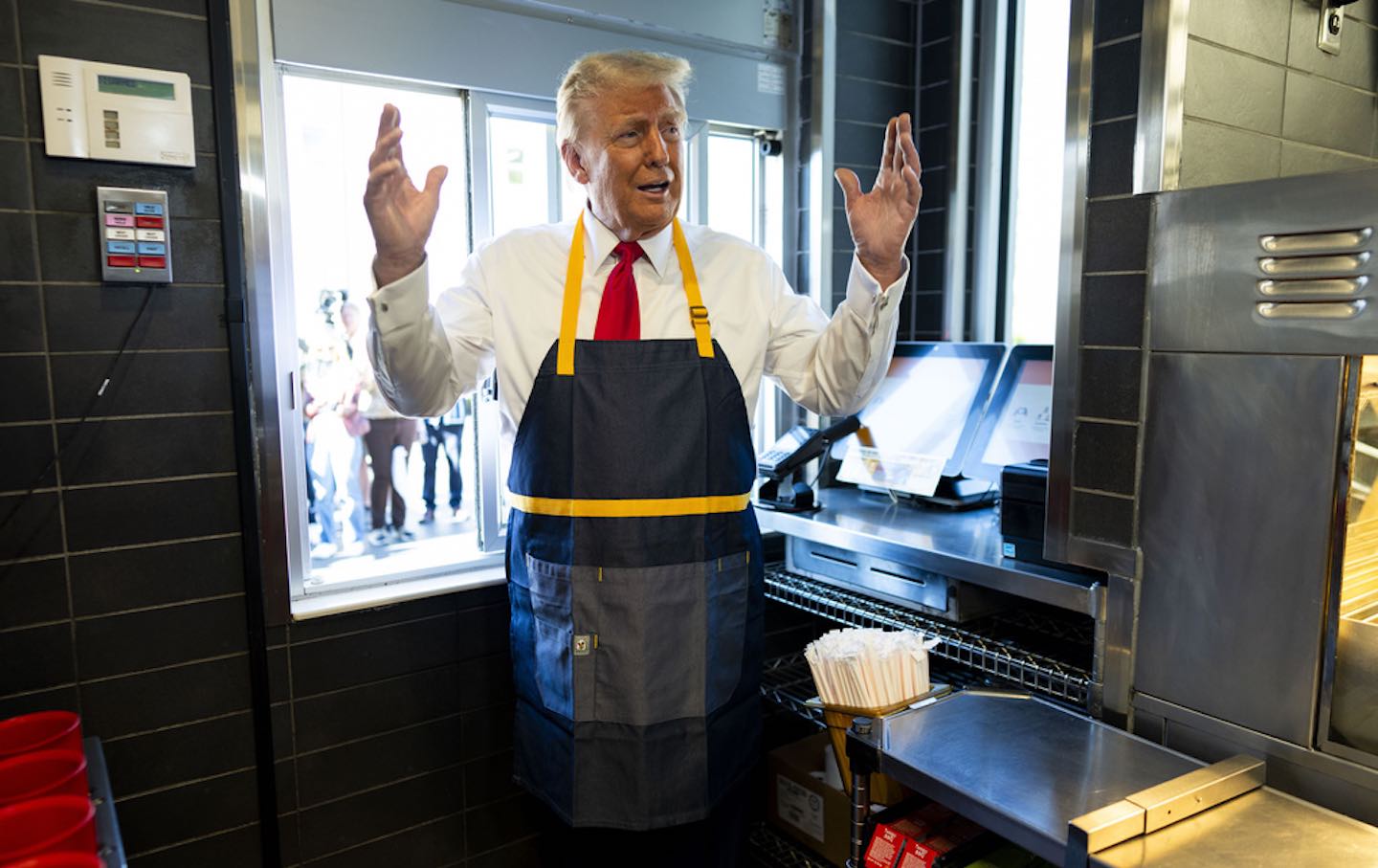
Trump Is Serving Up False Promises to American Workers—With a Side of Fries Trump Is Serving Up False Promises to American Workers—With a Side of Fries
The former president has always pretended to identify with working-class voters. Yesterday, at a campaign stop in Pennsylvania, he pretended to be one of them.
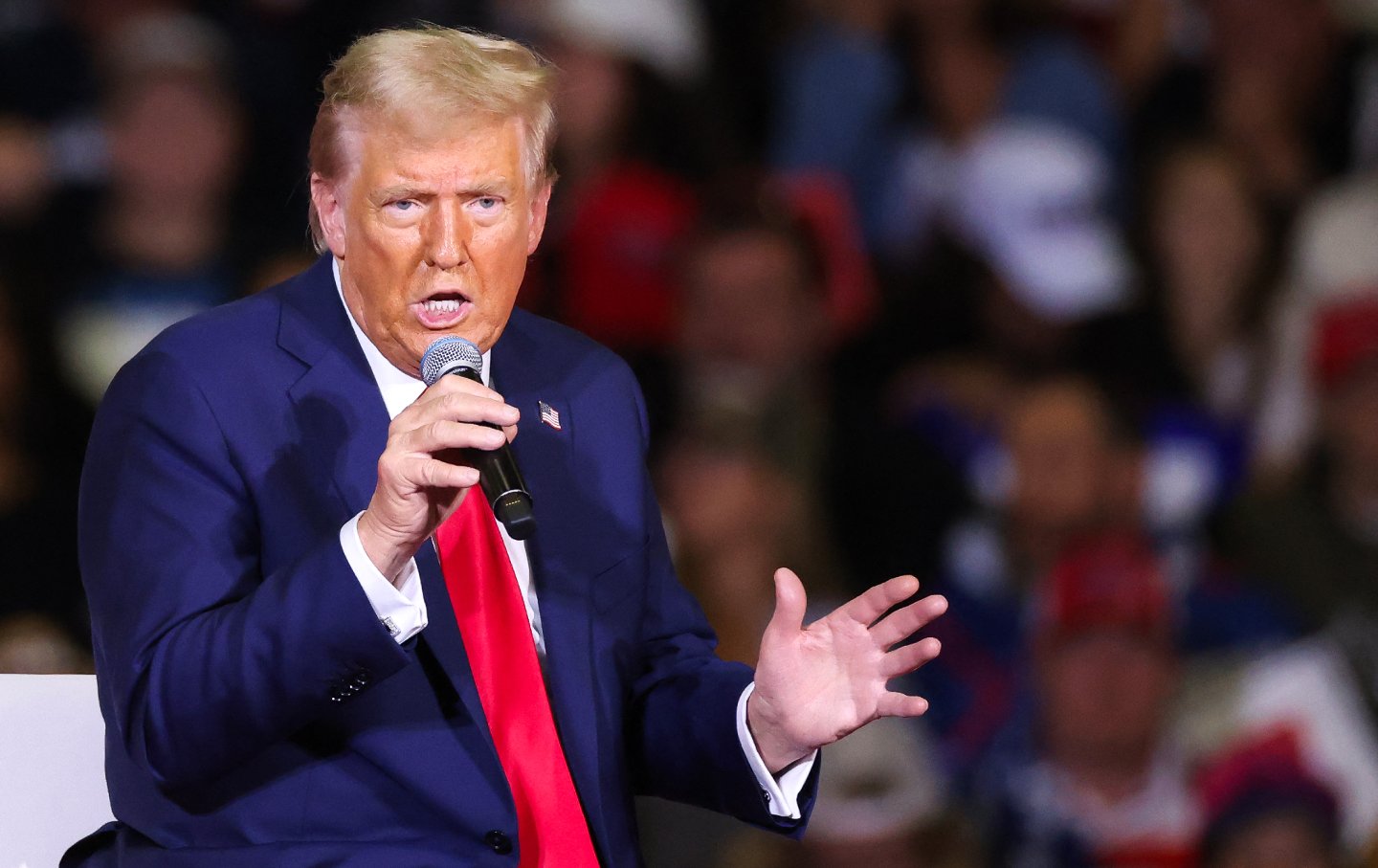
Finally, Trump’s Derangement Is Breaking Through in the Media Finally, Trump’s Derangement Is Breaking Through in the Media
It took a reference to Arnold Palmer’s penis to get more mainstream reporters to tell it like it is. That’s progress.

Arab Americans Warn Kamala Harris: Don’t Take Us For Granted Arab Americans Warn Kamala Harris: Don’t Take Us For Granted
Arab voters could swing the election in places like Michigan—and, if the 44th annual ArabCon convention was any indication, Harris has a huge mountain to climb.
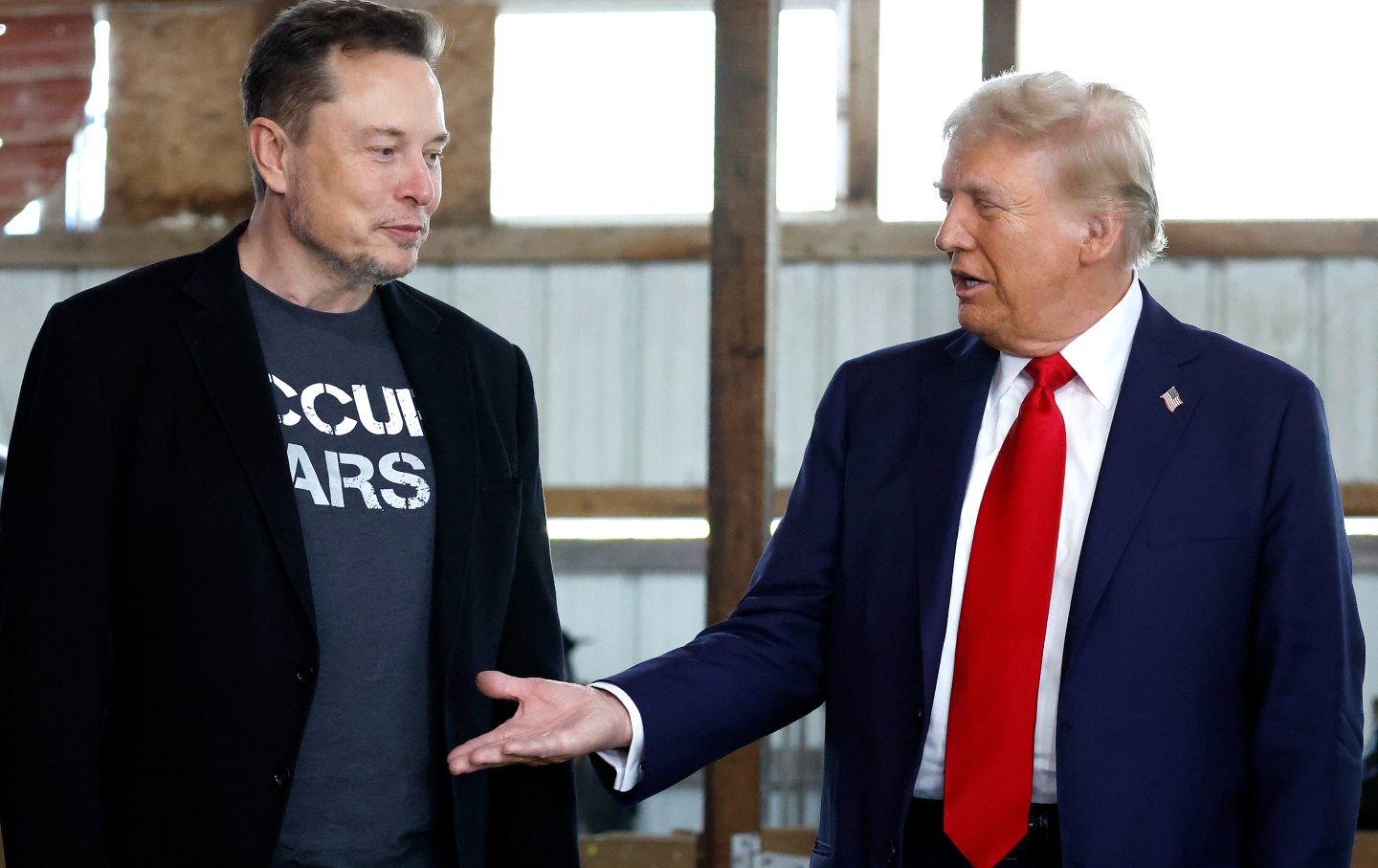
Elon Musk Gives Democrats a Chance to Run Against Oligarchy Elon Musk Gives Democrats a Chance to Run Against Oligarchy
Donald Trump’s richest supporter has been busy finding new ways to corrupt democracy.



